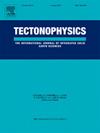咸水河南部断层的断裂行为和贡嘎山附近的地震活动:2022 年中国泸定 6.6 级地震序列的启示
IF 2.7
3区 地球科学
Q2 GEOCHEMISTRY & GEOPHYSICS
引用次数: 0
摘要
2022 年泸定 6.6 级地震发生在中国青藏高原东南缘咸水河断层墨西段。为了评估磨西段的地震潜力,我们研究了主震和余震序列的断裂过程以及历史地震活动。我们根据远震体波和区域 GNSS 静位移反演的首选滑移模型显示,东南方向的断裂由两个不同的突出滑移斑块组成,沿走向延伸 ∼ 15 千米,滑移峰值为 ∼ 2.8 米,大致平衡了自 1786 年上一次大地震以来的滑移缺口。莫西段北段经历了轻微的同震滑动,加上 2022 年主震引起的显著滑动缺失和库仑破坏应力正变化,表明该地区具有很高的地震潜力。莫西段沿线或附近分布着多个余震群,共震滑动区的下倾边缘∼8-12 千米处有走向滑动焦点机制。在贡嘎山东侧,另一个正断层余震群位于较浅的 3~7 km 处,在 9 个月的时间里地震率较高,其中包括 2023 年 1 月和 2 月的两次 M5 级地震。2015 年附近的大岗山水库蓄水后也发生了类似的强烈浅层正断层活动。我们推测,一些西北-东南走向的正断层最初是由贡嘎山东翼下的重力塌陷形成的,由于存在温泉和蓄水,流体流动进一步削弱了这些断层,2022 年主震引起的张应力变化又重新激活了这些断层。这些结果对于评估墨西段及其周边地区的地震危险以及走向滑动断层与附近山区之间的潜在相互作用具有重要意义。本文章由计算机程序翻译,如有差异,请以英文原文为准。
Rupture behaviors of the southern Xianshuihe fault and seismicity around Mt. Gongga: Insights from the 2022 MW 6.6 Luding (China) earthquake sequence
The 2022 MW 6.6 Luding earthquake occurred on the Moxi segment of the Xianshuihe fault at the southeast margin of Tibetan Plateau, China. To assess the seismic potential of the Moxi segment, we examine the rupture process of the mainshock and aftershock sequence, along with historical seismicity. Our preferred slip model inverted from teleseismic body waves and regional GNSS static displacements shows a dominant southeastward rupture consisting of two distinct, prominent slip patches along strike extending by ∼15 km, with a peak slip of ∼2.8 m, approximately balancing the slip deficit since the last major earthquake in 1786. The northern section of the Moxi segment experienced minor coseismic slip, which, together with the significant slip deficits and positive Coulomb failure stress change induced by the 2022 mainshock indicates a high seismic potential. Several aftershock clusters are distributed along or near the Moxi segment, with strike-slip focal mechanisms around the downdip edge of the coseismic slip area at ∼8‐12 km. At the eastern flank of Mt. Gongga, another cluster of normal faulting aftershocks is located at shallower depths of ∼3‐7 km, with high seismicity rate over ∼9 months including two other M5 sequences in January and February 2023. Similar intense shallow normal faulting activity had occurred after the impoundment of the nearby Dagangshan reservoir in 2015. We speculate that some NW-SE trending normal faults were initially developed by the gravitational collapse of Mt. Gongga underneath the eastern flank, further weakened by fluid flow, as supported by the existence of hot springs and water impoundment, and reactivated by the tensional stress change induced by the 2022 mainshock. These results have important implications for assessing the seismic hazard in and around the Moxi segment, and the potential interplay between strike-slip fault and nearby mountain areas.
求助全文
通过发布文献求助,成功后即可免费获取论文全文。
去求助
来源期刊

Tectonophysics
地学-地球化学与地球物理
CiteScore
4.90
自引率
6.90%
发文量
300
审稿时长
6 months
期刊介绍:
The prime focus of Tectonophysics will be high-impact original research and reviews in the fields of kinematics, structure, composition, and dynamics of the solid arth at all scales. Tectonophysics particularly encourages submission of papers based on the integration of a multitude of geophysical, geological, geochemical, geodynamic, and geotectonic methods
 求助内容:
求助内容: 应助结果提醒方式:
应助结果提醒方式:


